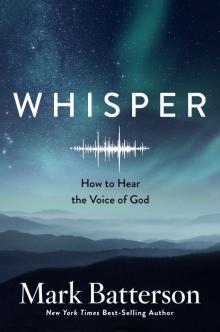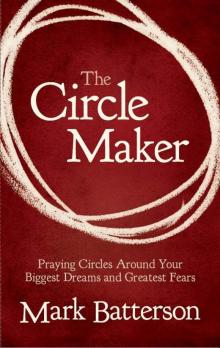- Home
- Mark Batterson
Whisper Page 14
Whisper Read online
Page 14
It’s a verse to us. It was a prophetic word for Timothy.
It’s tough to typecast Timothy, but let me try. I think he was more of a feeler than a thinker, as evidenced by his crying when he parted ways with Paul.11 A man hug is one thing; crying is next level. And I can’t prove it, but I think Timothy struggled with an inferiority complex. I don’t know if it was a function of age or a function of personality, but it seems that he struggled with insecurity, as indicated in Paul’s letter to the Corinthians: “When Timothy comes, don’t intimidate him.”12 Things that make you go hmmm.
All of that adds up to Paul’s exhortation.
The word timidity comes from the Greek word deilia.13 It’s the only occurrence of that word in the New Testament, and it means “cowardice.” It’s the inability to face danger without showing fear. It’s a lack of grit. It’s a failure of nerve. First-century historian Josephus used the word to describe the ten spies who brought back bad reports about the Promised Land out of fear of the giants. And it’s the opposite of a martyr. In other words, a person who denies his faith to save his life.
On that note let me tell you how Timothy died. According to church tradition, he died at eighty years of age trying to stop a pagan parade!14 What happened to timid Timothy? That’s not timid at all. Timothy was dragged through the streets and eventually stoned, dying a martyr’s death. I think Timothy was done playing the coward, done being intimidated. I think he determined to do exactly what his spiritual father had done: fight the good fight, keep the faith. And I can’t help but wonder if this act of courage traced back to one word of exhortation, if Timothy heard Paul’s voice above the parade.
If you’ve tracked with me this far, I think we’ve built up enough trust for me to speak a word of exhortation: quit using your personality as an excuse! When you use your personality as an excuse, you no longer have a personality; your personality has you.
When God called Jeremiah to be a prophet, he starting making excuses. He said, “I can’t speak for you! I’m too young!”15 And we do the same exact thing, don’t we? We’re too much of this or not enough of that. But if God is sovereign, then we can’t be too young, too old, too timid, or too bad. God cut Jeremiah off: “Do not say, ‘I am too young.’ ”16
What parts of your personality have been a crutch?
What excuse do you need to confess?
Abraham was too old.
Moses was too criminal.
Peter was too impulsive.
James was too analytical.
John was too emotional.
Timothy was too timid.
You tell me your excuse, and I’ll tell you where God wants to use you. That’s how He puts His grace and His glory on display.
The Johari Window
When I was in graduate school, I was introduced to a fascinating matrix on human personality called the Johari window. In case you care, Johari is a combination of the names of the two guys who came up with it, Joe and Harry. The quadrants are really four windows into personality and identity.
The first quadrant is the arena quadrant, and it consists of those things you know about you and others know about you. It’s your public persona. It’s your Facebook feed. It’s what everybody knows, everybody sees.
The second quadrant is the facade quadrant, and it consists of those things you know about you but others don’t know about you. This is your alter ego. This is who you are when no one is looking. This is the curtain that hides the real Wizard of Oz. The second quadrant is where we fake it to make it, but we’re only fooling ourselves. It’s why we get stuck spiritually. It’s why we hide emotionally.
When I was in kindergarten, I had a crush on a little girl in our church, and it must have been obvious, because my parents said something about it in the main sanctuary with other people present. I can’t remember what they said, and I’m sure it was absolutely innocent. I have wonderful parents. But I remember a feeling of shame that I can’t quite put into words. When we got home, I locked myself in my bedroom and made a sign that read “I’m never coming out.” And I never did. Sure, I came out for dinner. But I never came out emotionally. It took me a long time to admit to anyone that I liked a girl, because subconsciously I was afraid of being made fun of. And that’s on me, not my parents. But it became a taboo topic. I hid those feelings, didn’t answer those questions, and avoided those conversations.
We all have things we hide behind the facade. We cover it up with a Sunday smile, but it’s the deep disappointment we’ve never fully reconciled and the acute anxiety when we find ourselves in certain situations. It’s secret sins we’ve never had the courage to confess and secret dreams we’ve never dared to verbalize. The net result is shallow conversations and superficial relationships, and that isn’t the abundant life Jesus promised.
The only way out of the second quadrant is confession. And I don’t mean just confessing your sins to God. Take it a step further: “Confess your sins to each other and pray for each other so that you may be healed.”17 While you’re at it, confess your excuses. And your fears. And your weaknesses. And your doubts.
Confessing our sins to God nets forgiveness, but confessing our sins to each other is a critical part of the healing process. And it’s not just for you; it’s also for the person you’re confessing to. The Enemy wants you to keep your secret a secret; it’s an ancient isolation tactic. It’s only when we confess our sins to each other that we realize others are also struggling with pride or lust or anger. And now we can actually help each other, challenge each other, and hold each other accountable. Confession gives the other person the opportunity to encourage us, exhort us, and console us.
“If we could read the secret history of our enemies,” said Henry Wadsworth Longfellow, “we should find in each man’s life sorrow and suffering enough to disarm all hostility.”18 Everyone you meet is fighting a battle you know nothing about—until he or she confesses it, of course.
As I see it, we have two options: an alter ego or an altar ego. Having an alter ego means pretending to be who we’re not, and it’s absolutely exhausting. The other option is to put our ego on the altar and find our full identity in Jesus Christ. That’s how we silence the loudmouth ego. Putting our ego on the altar means accepting God’s assessment of who we are, the apple of His eye. And seeing ourselves as anything less than who He says we are is false humility.
The Blind Spot
That brings us to the third quadrant, the blind spot quadrant, which consists of those things you don’t know about you but others know about you. This is getting ready to go on stage with your barn door open. You need someone in your life who loves you enough to say what needs to be said: “Zip it up!” This is where we need spiritual fathers and spiritual mothers who have been there and done that. This is where we need friends who have permission to speak the truth in love. This is where we need accountability partners who can call us on the carpet and remind us that we were born for so much more.
At the place where the optic nerve passes through the optic disk, all of us have a literal blind spot. It’s approximately 7.5 degrees high and 5.5 degrees wide. We rarely notice our blind spots because our brains are so good at filling in the blanks based on visual clues, but they’re also where we’re most susceptible to misjudgment, misinformation, and misunderstanding.
One of the first lessons learned in driver’s education is to check your blind spot before changing lanes. That’s one way to avoid accidents. And what’s true of driving is true of life. It’s also why the fifth language—people—is so critical. Without the influence of others, we develop blind spots. And those blind spots are spiritual weak spots.
One of the defining moments of my life was the day an intern had the courage to call out the pride he saw in me. At first I was defensive. But when I realized that he was right, I repented. I also made a vow that I’d do my best not to talk negatively about other churches or pastor
s. I decided to do the opposite, and it’s become a mantra around National Community Church: brag about people behind their backs.
Maybe you’re more mature than I am, but I generally don’t like it when someone says what I don’t want to hear. But if it’s what I need to hear, that’s the person I’ll thank most at the end of the day. It’s been fifteen years since that defining moment, but I’m still indebted to that intern who noticed a hint of pride and loved me enough to tell me.
Remember the voices that deafen us to God’s voice? The voice of criticism can blind us to our own potential. But if the truth is spoken in love, the right word at the right time has the power to open our eyes.
We all have unresolved issues and unhealed hurts. We have a plethora of defense mechanisms, conditioned reflexes, and coping strategies that we aren’t even aware of. If we’ve been in intimate relationships with those we trust and they’ve violated our trust in some form or fashion, it leaves scars. That scar tissue can make it tougher for us to trust the next time. And if we aren’t careful, we sabotage ourselves with self-defeating behaviors because we’re subconsciously afraid of it happening again.
The only way to overcome those self-defeating dimensions of our personalities is ruthless self-discovery. And it’s so much more than self-help. “Without knowledge of self,” said John Calvin, “there is no knowledge of God.”19 If done correctly, personality assessments help us discover the way God has wired us. The obvious danger is that we pigeonhole ourselves and others. Or as I’ve already mentioned, we use personality as an excuse. Let’s not do that, but ignorance is not bliss either.
I love StrengthsFinder.20 As the name suggests, it helps people discover their God-given gifts. But I also value the Enneagram because it helps us identify the deadly sins we are most susceptible to. According to author and pastor Ian Cron, “Each personality’s deadly sin is like an addictive, involuntary repeated behavior that we can only be free of when we recognize how often we give it the keys to drive our personality.”21
There is a healthy and holy manifestation of our personalities, but there is an unhealthy and unholy manifestation too. And there is often a fine line between those two. We need people who are full of grace and full of truth to help us navigate that line and hold us accountable when we cross it.
Consider the Source
The fifth language is the most commonly used, but it’s also the most commonly misused and abused. So let me share some hard-earned advice before we get to the fourth quadrant. God speaks through people, but those people are as imperfect as we are. So here’s a good rule of thumb: consider the source. An insult from a fool might be a compliment, and a compliment from a fool might be an insult. Either way, you have to consider the character of the person saying it.
In my experience, God speaks to us through friends more frequently than strangers. I’m not saying God can’t use someone you don’t know to say something you need to hear. He most certainly can, and He most certainly has in my life. But speaking the truth in love is an earned right, and it’s the by-product of relationship. The stronger the relationship, the more weight those words carry.
I know far too many people who have been hurt by careless words. That doesn’t mean we tune out everybody and stop listening. It just means we better be more discerning. In the words of the apostle Paul, “Weigh carefully what is said.”22 Before you buy what someone is selling, make sure it passes through the filter of Scripture. And don’t just consider the person’s words; consider his or her character when giving weight to the words.
Now let me flip the script. If you are dialing into the still small voice of the Holy Spirit, there will be moments when God gives you a word to speak into someone else’s life. Paul delineated three different types of words: a word of wisdom, a word of knowledge, and a prophetic word.23
Sometimes God speaks to us for us.
Sometimes God speaks to us for others.
One of the greatest gifts you can give someone is not just to pray for that person but also to listen to God for him or her. If you cultivate a prophetic ear, God will give you a prophetic voice. But it comes with a caution: what’s true of listening is true of speaking. Jesus said, “Do not…cast your pearls before swine.”24 It’s the corollary to “consider the source.” Simply put, consider the person. If someone isn’t ready, willing, or able to hear what you have to say, you’re wasting words. If you discern a lack of readiness, you might need to do what Jesus did: hold your tongue. Jesus said, “I have much more to say to you, more than you can now bear.”25 The right word has to be spoken at the right time, or it can actually have the wrong effect.
Prophetic Ear
My spiritual father, Dick Foth, has been preaching for more than fifty years, but something happened recently that had never happened to him before. In the middle of a message, Dick sensed in his spirit that someone was on the verge of an affair that very week. That impression came out of nowhere, and Dick wasn’t entirely sure what to do with it. It was a calculated risk, but he figured he better say something. So he interrupted his own sermon and said, “There is someone here who has set themselves up to have an affair. The pieces are in place, and you were planning on making the decision today. Don’t do it.” After the service a middle-aged man gave Dick a big bear hug. When he did, he whispered, “That was me. Thank you.”
Dick is one of the most unassuming people you’ll ever meet and one of the nicest too. That word of knowledge was a little out of the ordinary for him, and he’d even say it was a little out of his wheelhouse. But his obedience to that whisper quite possibly altered a family tree for generations to come. The right word spoken at the right time can echo for eternity, and it starts with a prophetic ear.
I can’t imagine him ever introducing himself this way: “Hi, I’m Dick. I’m a prophet.” Most of us run away from people who self-identify that way. But let’s not shy away from spiritual gifts. We mistakenly think of prophets as oracles who predict the future, but that isn’t the biblical definition. It’s more forthtelling than foretelling.
By definition, a prophetic word is strengthening, encouraging, and comforting.26 That doesn’t mean it can’t be confrontational, but it’s always redemptive. And it should be delivered with a gentle spirit.27
You may not think of yourself as a prophet, but it’s who you’re called to become. Jewish philosophers did not believe that the prophetic gift was reserved for a few select individuals. Becoming prophetic was seen as the crowning point of mental and spiritual development. The more people grow spiritually, the more prophetic they become. Moses himself said, “I wish that all the LORD’s people were prophets.”28
One footnote. Just like natural talents, supernatural gifts must be exercised. You’re not going to be great right out of the gate, and I know this from personal experience. My first sermons were more pathetic than prophetic. My first “official” sermon was in a country church in Macks Creek, Missouri. That poor church! I was taking a class in eschatology at the time, so I laid out an entire time line for the end times, a time line that changed from class to class. I owe that church an apology in heaven.
I’m a work in progress, and so are you. But don’t let inexperience keep you from exercising your gifts. Don’t let doubt keep you from exercising your faith. And don’t let the fear of people keep you from speaking into their lives, as God leads. My only exhortation is that we do so in a spirit of humility. Let love lead and the gifts follow.29
Dick Foth has permission to speak into my life, but he often uses a little disclaimer before doing so. He says something like, “If ten is a word from God and one is a word from Foth, this is a four.” Or it might be a two or a five or even a nine. I like that approach because it suggests something supernatural, but it also allows for a margin of error.
The Unknown Quadrant
The fourth quadrant is the unknown quadrant, and it consists of those things you don’t know about you and others don�
�t know about you. I call it your soulprint, and it’s the truest thing about you. It’s your God-ordained passions, your God-given gifts, and your God-sized dreams. It’s the potential that can be tapped only in a relationship with the One who gave it to you in the first place.
God knows you better than you know you. Not only did He knit you together in your mother’s womb, but He has prepared good works in advance with your name on them.30 If you want to discover who you really are, seek God.
Author and speaker Sir Ken Robinson hails from Liverpool, England, the same hometown as Sir Paul McCartney. One day as they were comparing notes, Sir Ken discovered that Sir Paul hadn’t performed very well in his musical studies. His high school teacher didn’t give him good marks and didn’t even notice any innate talent. Amazing, right? But it gets even better! George Harrison, lead guitarist for the Beatles, had the same teacher. And he didn’t fare any better than McCartney. “Let me get this straight,” Ken said to Paul. “This teacher had half of the Beatles in his classes and didn’t notice anything out of the ordinary?”31
Part of the genius of Jesus was His ability to see potential in unlikely places and unlikely people. Where others saw problems, Jesus spied potential.
Remember what the Pharisees said when a prostitute crashed their party? “If this man were a prophet, he would know who is touching him and what kind of woman she is—that she is a sinner.”32 That’s half-true. A prophet certainly perceives present-tense realities. Jesus knew exactly who she was, but He also saw who she could become. And He treated her accordingly.
“If you treat an individual as he is, he will remain how he is,” said Johann Wolfgang von Goethe. “But if you treat him as if he were what he ought to be and could be, he will become what he ought to be and could be.”33
The word prophet has come to connote doom and gloom, and I’m not suggesting sugarcoating. But, again, a prophetic word strengthens, encourages, and comforts.34 It’s edifying, not insulting. It endows hopefulness, not helplessness. It boldly believes that the best is yet to come.

 Jack Staples and the Ring of Time
Jack Staples and the Ring of Time Jack Staples and the City of Shadows
Jack Staples and the City of Shadows Jack Staples and the Poet's Storm
Jack Staples and the Poet's Storm Whisper
Whisper The Circle Maker_Praying Circles Around Your Biggest Dreams and Greatest Fears
The Circle Maker_Praying Circles Around Your Biggest Dreams and Greatest Fears